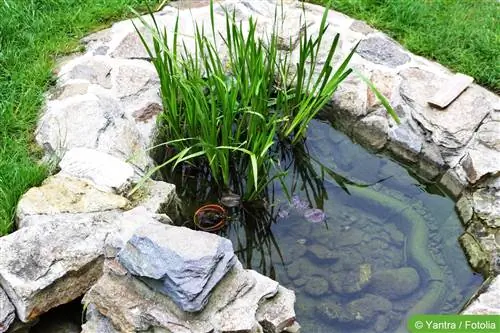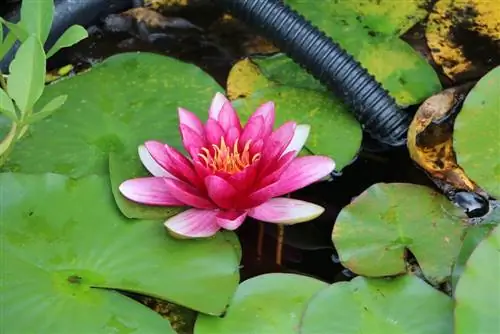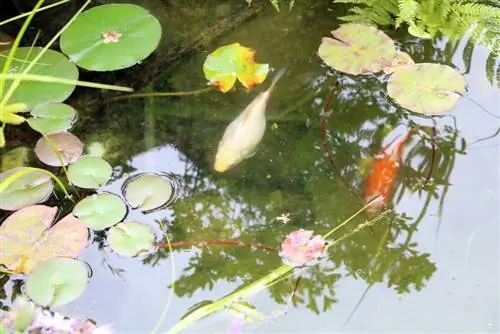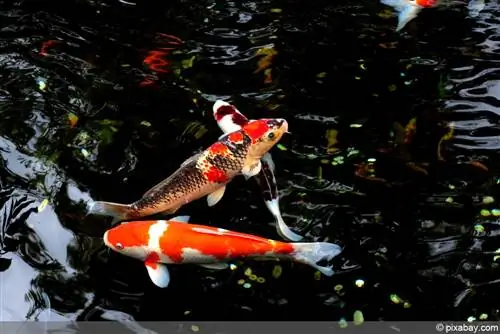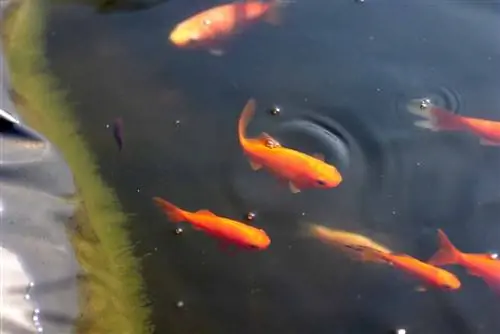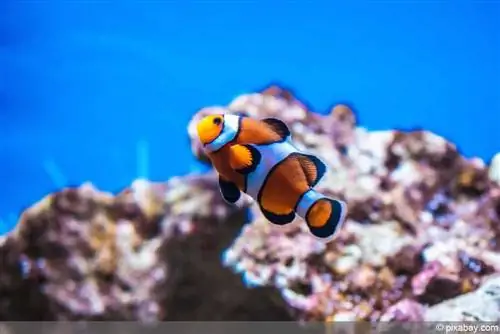- Author admin caroline@plants-knowledge.com.
- Public 2023-12-17 03:39.
- Last modified 2025-01-24 12:45.
Since a mini pond is not particularly deep, it can freeze through in very frosty temperatures. The logical consequence of this is that all fish in the pond as well as non-hardy plants die. How to winterize a mini pond and what you should know can be found in the following text.
Make the right preparations in the fall
If the temperatures fall below 8 °C, you should stop feeding the fish in the pond. From now on the fish move less and eat much less during the cold period. If the temperatures drop below 8 degrees, you should bring the mini pond into the house and protect the fish from the cold. If the pond's basin is deeper than 80 cm, the fish can overwinter outside. But if the mini pond is not that deep, the fish have to be brought into the house so that they don't freeze to death. The most sensible solution is to carefully disassemble the mini pond and store it frost-free in the basement or garage:
- To do this, you should remove coarse dirt such as leaves with a net.
- The fish should be moved to a large tank or large barrel.
- But the water temperature should be approximately the same.
- It is also possible to drain the water for transport and refill it in the cellar.
- Ideally, the pool should be completely emptied and cleaned.
- To do this, the pond plants are carefully cut back and freed from dead plant parts.
- The pond plants should be placed in a tub.
- It's important that it doesn't get too cold in the place.
- Many pond plants cannot tolerate frost and would die if temperatures were too frosty.
- When removing the plants from the pond, make sure that no roots or he althy leaves are damaged.
- Overgrown plants can be cut carefully either by hand or with a knife.
Typical pond plants such as water hyacinth and water lilies are now well prepared for the winter and ready to be placed in the mini pond again in spring.
Cleaning the pond
After removing all the fish, plants and equipment from the pond, it is important to clean the mini pond basin thoroughly. Over the course of the year, many bacteria and stubborn dirt settle, which can now be easily cleaned. To do this, you should first remove any coarse dirt from the basin and then wipe it out with plenty of warm water and a little cleaning agent. The pool can now dry well and is clean. After cleaning, the mini pond can then be set up and filled outside again in mild temperatures. Accessories such as the pump and filter should also be cleaned carefully. The pump may be needed again later to pump the water into the wintering barrel.
The fish hibernate
As mentioned above, the fish should be brought into the house if the tank is lower than 80 cm. In order to keep the fish he althy and stress-free over the winter, you should get a rain barrel. The fish can be easily moved from the pond to the bin with a net and stored in the basement or garage. However, it is important that there is no frost where the fish overwinter. You should also limit feeding now, because fish such as the tench also hibernate. If the bin is equipped with the pump, you can cover it with a board. You should definitely place the board on the barrel so that the fish and the water are protected from external influences such as dirt, insects, etc. A tarpaulin is also sufficient to protect the fish and the water. When filling the water into the bin, it is ideal to use a mixture of fresh water and pond water. This means the fish are still used to the pond water and also receive fresh water.
What happens after winter
Feeding the fish should be resumed a few weeks before releasing them into the mini pond. You start feeding by adding very little food to the water and increasing the amount a little. The fish need around 4 to 8 weeks to get used to the “normal” amount of food again. You should only rebuild the mini pond when the temperatures remain above freezing at night. Here too, a mixture of barrel water and fresh water is ideal for getting the fish used to the new situation. Fish that are ideal for a mini pond include disc bass. Disc bass remain very small and are therefore ideal. Depending on the size of the tank, it is also possible to keep a few goldfish or tench in the tank.
If these tips and advice are followed, you can do good for the fish and the tank in winter. The pool can be cleaned and is germ-free for use next year. It is not stressful for the fish to overwinter in the cellar and there is no risk of losing fish due to cold death. The pool can then be rebuilt without any problems in the spring. All overwintered plants and fish can now be put back into the pond and spend the warm summer there until they go back to the quiet cellar to overwinter in the fall.
Not everyone has a large garden, but many of them still want to have a pond and therefore choose a mini pond. It can find its place on the terrace as well as on the balcony and so you can bring a little nature onto the terrace or balcony even if you don't have a garden.
What you should know about fishing in mini ponds
- In a concrete pot or a zinc tub it is better to avoid animals and instead rely on beautiful plants.
- Water lilies are particularly suitable here, although they also require a certain depth so that they can grow nicely.
- Green algae, which are available in many different types, are more suitable.
If you don't want to do without such a mini pond with fish, you should use at least the smallest pond tub that specialist retailers have to offer:
- A good guideline is a capacity of at least 200 liters.
- Furthermore, when stocking with fish, it is important to ensure that you choose fish that require little space.
- The fish should not be very active in swimming either.
- It is also important to ensure that not too many fish are put in the mini pond.
As an alternative to a mini pond, you can also use a moor bed. You can also use many beautiful plants here and there are many different insects that then settle here. This way you at least have a few animals on the balcony or terrace.

